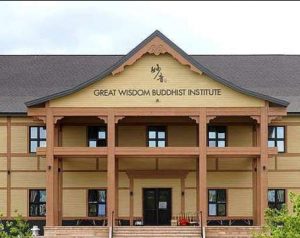
The Importance of “Sincere Mind”
“Sincere Mind” is the first of the “Three States of Mind,” in other words, “Sincere Mind,” “Deep Mind,” and “Mind of Merit-Dedication and Aspiration towards Rebirth.” The Contemplation Sutra says that sentient beings who resolve to be reborn in Amitabha’s Pure Land, the Land of Bliss, having generated the Three States of Mind, are reborn there without question. This is a very important message to all Pure Land practitioners because under these circumstances, rebirth in the Land of Bliss, the only goal of Pure Land Buddhism, is assured.
Unfortunately, there is no further elaboration on the Three States of Mind in the Contemplation Sutra, in which this statement was made by Shakyamuni Buddha. However, Master Shandao, the de facto founder of the Pure Land school of Buddhism in China, explained the Three States of Mind in detail in his Commentary on the Contemplation Sutra, which is regarded as the key to the door of the path leading to the Land of Bliss.
When Master Shandao began to explain Sincere Mind he immediately equated it with “Genuine Mind,” mentioning the latter 12 times. What is meant by “genuine” and “not genuine” in the law of causal conditions and karmic theory in Buddhism? Why is it so important for all Pure Land practitioners to embrace this concept in their practice, in order to be reborn in the Land of Bliss?

The Literal Meaning of “Genuine Mind”
Literally speaking, Genuine Mind is established when our thoughts are consistent with our deeds and the internal is aligned with the external. However, through their inherent nature as human beings in the Six Realms, ordinary beings habitually tend towards discrimination and inconsistency, which is known to be false and hypocritical. What they say diverges from what they think. Their words and thoughts are not genuine, thus they do not have “genuine mind.”
Master Shandao pointed out that ordinary beings are defiled by greed, anger, and deviousness as well as hypocrisy, and that their iniquitous nature is difficult to change as long as they continue to reincarnate within the Six Realms of the mundane world. Though their virtuous practices often make them seem good-natured and benevolent, they cannot control or alter the intrinsic nature of their delusive, false, discriminative minds. For instance, they cannot relinquish the idea of a truly existing self, and any merit and virtue attained through practices accomplished on the basis of “self-power” are therefore considered impure. Thus, their practices are by nature regarded as “contaminated acts of virtue.” They are also called “empty,” “false” deeds, rather than “genuine” actions.
Thus, no matter how hard and how long they practice, the inferior quality of the merit and virtue generated remains unchanged. The Amitabha Sutra says: “One cannot attain rebirth in that land with ‘few’ virtuous roots and ‘little’ merit as causal conditions.” Master Shandao indicated that, if they dedicate such flawed virtue toward rebirth in Amitabha’s Pure Land, they will certainly not attain it.
On the other hand, Amitabha is absolutely pure, natural, and truthful. While he was practicing the bodhisattva path in the causal ground, his thoughts and actions at each moment were genuine. What he did, said, and thought resembled spontaneous and reflex actions in that they did not involve discriminative thought or any attachment to an idea of “self.” His thoughts were truly consistent with his deeds, and the internal truly aligned with the external. Thus, he was truly in “genuine mind.”
Though Amitabha is now a Buddha, with his “genuine mind” he continues to cultivate immeasurable genuine merit and virtue for sentient beings, which he dedicates to those who exclusively recite his name in order to be reborn in the Land of Bliss.
“Genuineness Benefited by Other” (Amitabha)
This “genuine” merit and virtue dedicated by Amitabha have the wonderful and inconceivable function of automatically affecting and purifying one’s mind and naturally converting one’s false mind to genuine mind, which then creates the genuine “seed” of virtue necessary for rebirth in the Land of Bliss. Thus, they are known as the roots of “abundant” virtue and “plentiful” merit, which enable sentient beings to be reborn in the Land of Bliss.
In this respect, Amitabha-invocation in body, speech, and mind is regarded as “genuine” practice, and will allow the practitioner to receive the “genuine” merit and virtue dedicated by Amitabha. Subsequently, the genuine “seed” of virtue is naturally created in one’s mind, which is then known as “genuine mind.” Master Shandao called it “genuineness benefited by other” (Amitabha).
Why is genuine mind necessary for rebirth in the Land of Bliss? It is because the Land of Bliss is the genuine land of reward, graced with the genuine merit and virtues of Amitabha. One must possess the equivalent “seed” of virtue produced by “genuine mind” in order to produce a “genuine body” in the genuine Land of Bliss.
Strictly speaking, the “seed” should be identical to that of Amitabha in order to be reborn in the Land of Bliss. In the Commentary on the Shastra of Rebirth, Master Tanluan says: “In the Land of Bliss, all beings are born through manifestation in the lotus flower of Amitabha Buddha with his pure and perfect Enlightenment. This is because all the beings are born the same way with one single cause—Amitabha-recitation, and no other causes or virtuous ways.”
In the past few articles on Buddhistdoor, I have discussed the formation of the Land of Bliss and its splendid nature arising from the genuine or substantial merit and virtue of the Buddha Amitabha. We must be aware that in order to be reborn there, we must let go of all the “contaminated acts of virtue” or “tainted acts of merit” initiated by the mind of self-power in the mundane world, and rely on the “genuineness” generated by Amitabha through exclusive Amitabha-invocation in body, speech, and mind. This is the hidden meaning of “Sincere Mind” as explained by Master Shandao in his Commentary on the Contemplation Sutra.
The quotations from the Commentary on the Shastra of Rebirth and the Amitabha Sutra are translated by the author.








